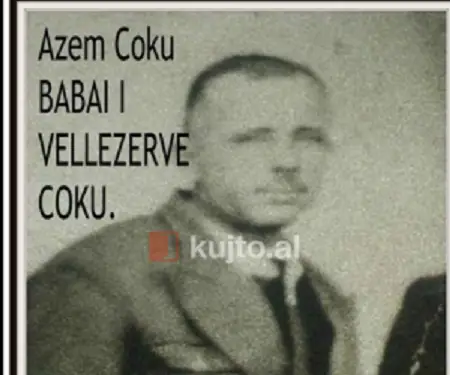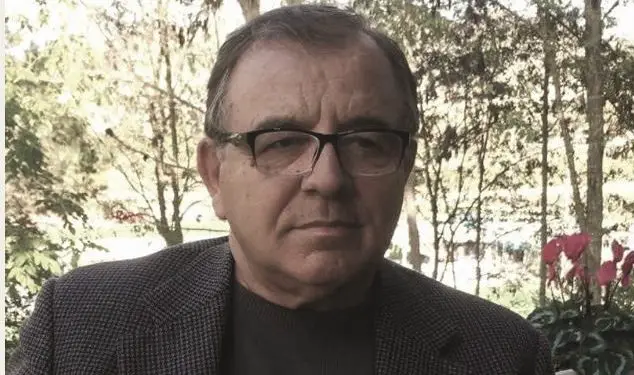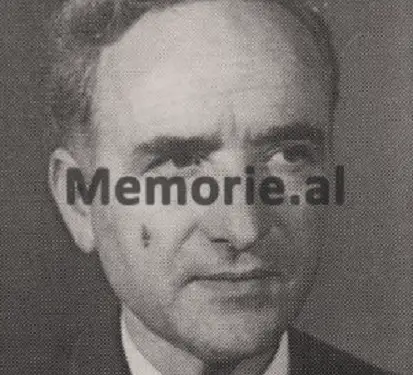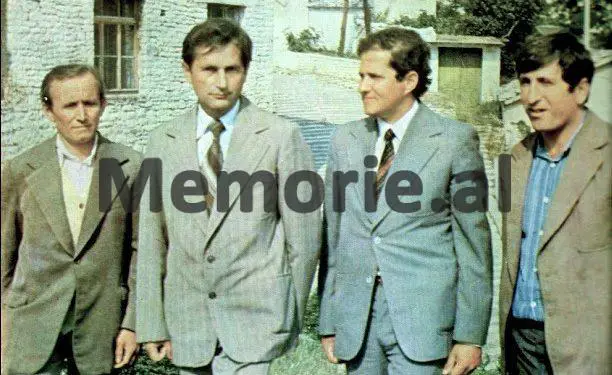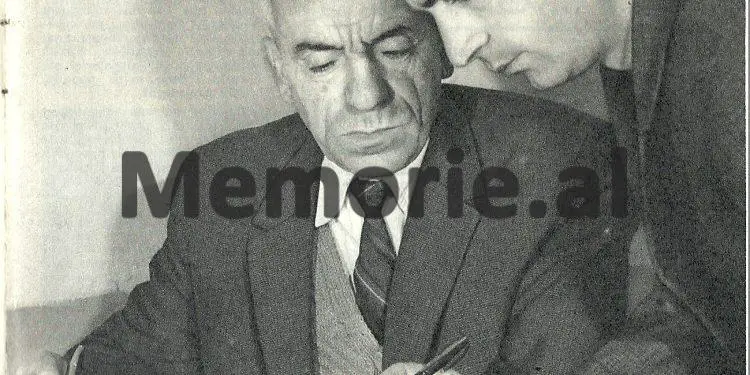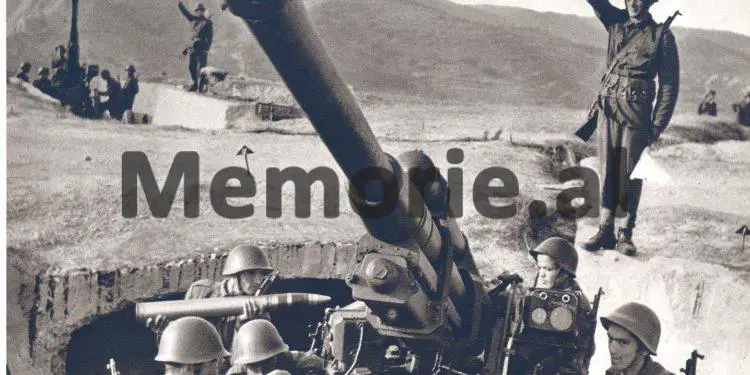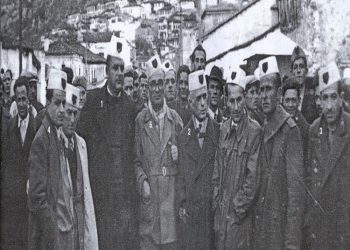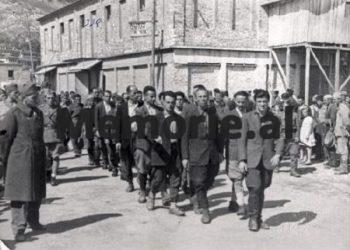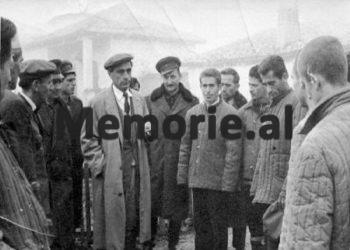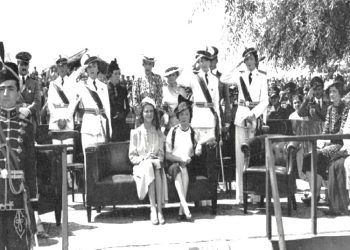From DALIP GREECE
The first part
Memorie.al / Esat Çoku, together with his wife Zyhrana and son Francin, live in Pelham Park Way, in the Bronx, NY, but Esat spends the summer months in his beautiful house, which he built in the village of Mucias, near Karavasta Swamp, in the Municipality of Remas, in Lushnje. In the story of Esat and Zyhra’s daily life, here in New York, there is nothing special to note: They are immigrants, like everyone else, they work in ordinary jobs, they get tired and worn out, and not infrequently it can happen that to express any kind of “concern” about exile, at the age of retirement. But when they turn their heads from their son and see his dedication to studies, the very good integration results in American life, they make the sufferings of exile “halal”.
This couple that I introduced to you, all days of the week are tired in hard work, as are all unskilled jobs, while at the end of the week you will find them happy in the company they have chosen here in emigration, with whom they spend their time free weekends, sometimes going out for a walk, sometimes a conversation in Albanian clubs, sometimes in the many activities that take place in New York, and not infrequently visiting each other. In their company there are ordinary people, there are ex-diplomats, ex-officers, engineers, journalists, there are also ex-persecuted of the communist system, with whom they are united by suffering and anti-communist resistance.
The persecuted are the co-sufferers of Esat, but he does not prejudice people, he is completely tolerant, non-judgmental in what he and his family have taken away. He does not blame his own and his family’s sufferings on any kind of person, they were the product of the communist system. The former deputy of the Democratic Party took the path of exile here five years ago, while his other brother, Çaush Çoku, began to tread the paths of exile immediately after prison, in 1991.
Even though he was declared an “enemy” and was arrested “in the name of the people” as an “enemy of the people”, (Who asked the people?!) Esati thinks longingly for Albania and says that it will be difficult if he does not return one day there, where he left everything; both the joys, and the sufferings, and the shackles, and the graves of loved ones; and the earth; both the vineyard, the house in Mucias, and the apartment in the capital. Even the “enemies” love the Motherland!
An expression of tolerance is also the act of reconciliation of the Çoku family, with the 26 false witnesses who came against them in the court proceedings, when Azemi was convicted, and the sons, Bedriu, Çaushi and Esati. “We could not agree with only six of the witnesses, who died before we were released from prisons,” says Esati. – For us, they were the unfortunates of an anti-human system, forgiveness and mercy were the most we could do for them”.
Tolerance and human love led Esat Çok to the Albanian Parliament (1992-1996). It is the most special case in Albania, when the former victim was in a room with the former investigator himself. Esati and his investigator, Bashkim Caka, were simultaneously deputies, one for the Democratic Party and the other for the Socialist Party! When he was in charge of the Association of Former Political Persecutors of Lushnja (1991-’95) or members of the presidency of the National Association of Former Political Persecutors of Albania (1991-’95), Esati cultivated neither hatred nor revenge, only asked for the integration of co-sufferers.
So also, the brothers, Bedriu and Çaushi, who, although they did not get involved in politics, proved to be worthy citizens. The nearly 30-year-old conflict in Albania has divided the Çoku family, one brother, Bedriu, has remained in Albania, after 15 years he has decided to enter politics, accepting to be a candidate for the deputy of the “Movement for National Development”, while Çaushi continues to be in Rome, as a journalist of the European Community.
Esati lives in New York. Another fact about tolerance: At the time of the crisis of democratic power, Bedriu was the deputy general director of the prisons of Albania. Fatos Nano, then he was in prison. Bedriu receives an order that no harm should happen to the life of the leader of the opposition. He goes by helicopter himself and saves Nano from the dangers that could threaten him.
When the socialists come to power with Nano as prime minister, the former himself asks to pay a visit to his home, to thank him for saving his life. Bedriu opened the apartment door and waited for him. A week later, the former deputy general director of prisons, Nano’s lifesaver, even though he had completed his law studies, even though he knew three foreign languages, found himself unemployed…! Nice reward!
ESMAJA, MOTHER OF PRISONS
At the beginning of emigration, Esati passed a difficult test. I had never seen him in such a heavy psychological state, terribly depressing. At home he was alone with his grandson, the family was still in Albania. He had received the bitter news of the death of Esma’s mother. “I was told not to lay a hand on my mother, just as I didn’t lay a hand on my father”, Esati cried and sighed those days.
When the father died, on December 12, 1982, the three brothers were in prison and could not be at the funeral of their beloved father, while now that the mother was dying, Esati was here, so far, the sea and the ocean captured. The status did not allow him to travel…! Mother Esmaja had fled from this world, while he had put her picture in a corner and was mourning and waiting for people who would come to treat his pain wound…!
It seemed that his chest could not bear the pain. Friends and acquaintances did not stop, but the wound of the soul was not easily closed…! He would ring the phone every now and then and get information about the funeral. He was talking to his brothers, but the words were wet with tears and the phone became mute…! He accompanied the distant procession until the funeral was over.
– “At least I should have given him a hand” – Esati repeated time and time again, grabbing his cheeks and squeezing them tightly and wiping his eyes that were shedding tears of pain. It was the warts. He drowned his despair with tears and sighs….!
… Esma Çoku had died, a suffering mother, one of the rare mothers who had faced evil with her rare stoicism. Many misfortunes had befallen him during the 50 years. Initially, they had handcuffed her husband, Azemi, after seizing his property and branding him “kulak”. She didn’t let her husband die alone in the cell, at least she didn’t let him starve, but she carried the bag on her back and brought him food. The unfortunate woman bravely tried to raise her sons, so that they would be successful.
It was not broken; neither when the declassified Çoku family was exiled from the city of Fier, to the “Dead Land” of Myzeqe, nor when they arrested their little son, Çaushi, nor when they handcuffed their second, Bedri, (both soldiers without rifles, in genius), not even when they left him alone, when they took away Esat. He would be left alone with Zyhra, Esati’s wife, who came back to him as a friend and sister, in the difficult days. Together, they took the road to meet the three boys, who were simultaneously imprisoned in Spaçi, Burrel, Qafë-Bari…!
They traveled for two or three days to go to the boys, “enemies of the power…”! There was no road, she tried to sleep outside, when they wouldn’t open the doors for fear that she was the mother of the sons of political convicts, while the young woman was the bride of the enemy. That’s how, with that bag on her arm, the good mother shepherded the mountains of Albania, to keep alive the souls of the boys, who suffered the absurd.
She really wasn’t a prisoner, but her soul was a hundred times more shackled than the hands of her husband and sons, swollen from the shackles. They were planned by that system as front-line opponents and were among the last to leave the hell cells. Bedriu was among the last prisoners who left the cells after Peres De Cuellar’s visit to Communist Albania.
Esat’s second brother, Bedriu, describing his mother in the book he has in hand, writes: “All those years of waiting have passed, which have given her a lot of anxiety, pain and terror, now it is not believed that she is free and the boys are free…”!
…. It is the year 1991. Bedriu, one of the political convicts, who was the last to be released from the Albanian prisons, with the help of the old society he had in Fier, manages to get a house in his childhood city and dreams; exactly in that place, that they had their barracks, before they exiled them to the Dead Land.
Mother Esmaja, who was used to the life of the village, seemed to find it difficult to re-learn to the life of the city, from where they had moved her to the ground at night. But on the other hand, it seemed to him like a dream, when he saw himself in that new house together with his son, who went like a gentleman to school, dressed for beauty in a suit and collar, where he taught foreign languages, who had taught them there, at the University – prison!
– “I’m not in a dream” – asked the lady of the house and wished to live as long as possible, to enjoy her freedom…!
“Three brothers in one handcuff”, a family 74 years in political prison
You can rarely find a family like this, which has spent its whole life in communist prisons. Taken together, the years of prisons and exiles become too much and weigh heavily on the nation’s memory, as for thousands of other families, who were denied a free life, simply because they were lined up on the opposite side of the communist barricade. Let’s follow the statistics:
– Azem Çoku – father – 11 years in prison.
– Çaush Çoku – the little boy – 22 years in prison.
– Bedri Çoku – the second son, 23 years in prison.
– Esat Çoku, the eldest son, 8 years in prison and exile…!
– Esma Çoku – Deported for decades… Azemi’s wife, mother of imprisoned sons; 64 years at the prison doors, following the fate of her husband and sons…!
The other brother, grandchildren, born and raised in the mud of the fields of the afflicted, exiled Myzeqe…!
If you combine the years of prison and exile for the Çoku family, you get more than a century of punishments. The above statistics probably do not need comment, but history should be remembered with good intentions, so that it is not forgotten. Poet, publicist and writer Visar Zhiti, for whom poetry was a “prostitute” that put him in prison and at the same time Saint Mary, who saved his soul in the sufferings of communist hell; he presented the two Çoku brothers in the introduction to their book; “Caush Coku & Bedri Coku; two brothers in one handcuff”, he writes in the preface:
“As the characters of a drama look and are like that, of a very heavy, lively drama, which cannot be played on stage, but in life; whose acts took place in the boring Purgatory of socialism and inside the hell of its dictatorship. They are the members of an honest family, oppressed workers, convicted and on the side of the name years of prison, where often their number is higher than half of each one’s life. Together they spent almost a century in prison and exile, until the fall of communism.
The Çoku family was in conflict with the new communist system. The conflict came from the years of the War, when Azem Çoku, the father of the boys who would be found aligned in the ranks of the National Front, in the war to free the Motherland from fascism and Nazism, would be punished after the liberation, only because he was not lined up in the ranks of the partisans. Ylli i Bufi’s father, who at that time was a leader of the local partisans, would even save him from the firing squad, because he himself owed his life to Azem.
The shooting of his friends in his eyes made Azem Çok more determined in his nationalist ideal, but this would cost him not a little, but 11 years in prison and a life deprived of freedom; abandoned by friends; had his property seized and would be pointed at; “Here’s the kulak”. This was the seal that would accompany him and his family throughout his life. After his imprisonment, the family was removed from the city and exiled to the “Dead Land”, synonymous with death itself. The internment of the family killed the dreams of the boys…!
BEDRIU, FORMER GYMNASTIC CHAMPION, CENTER OF THE SPACA REVOLT
Bedri Çoku, the second brother, did not think that one day his life would take that irreparable crack. He was among the best high school students in Fier. Among the boys, she was “spoiled”, in the sense of personality; he was a gymnastics champion, he stood out for his talent as an instrumentalist, the only accordion player in the gymnasium, one of the outstanding volleyball players of the “Apollonia” youth team, a talented writer. It had not occurred to him that one day, he would throw all this behind him and end up in a lost swamp village, where the name evokes the date…!
The Dead Land would be the host country, after the expulsion. Where would they live?! The palaces that their father once owned had been seized for public needs; they had to build a house themselves with wood and mud, the wood taken from the forest and the mud there, the only thing that was not missing in Myzeqe! There, the life of the high school student, the talented athlete began to drag on.
When he was getting used to that life of suffering, he comes to his village for a gymnasium activity, where he used to study. They wanted to make a surprise for their high school friends. But the Party and Youth comrades in the village had taken the measures; they spread the ideological poison, before the activity started and they said a thousand black things about Bedriu. High school students jumped to the defense of their former friend. But he paid dearly, even they found disaster later. Those who defended him were expelled from the action and from the gymnasium, because they had defended the enemy!
This was a bitter event that would shake Bedri’s rebellious spirit more and was the prologue of what came next. He was a convict, as the son of a kulak, who only awaited arrest. But this too would not delay; as well as his younger brother Çaushin, they were taken by soldiers. They had taken them to the genio, where the homeland was defended with wooden rifles, picks and shovels. Even there he tried not to give them a reason to kill him in the cell.
But they had planned it and his arrestees were men who consider themselves heroes of the nation; one of them was Mark Dodani himself. Bedriu says that his arrest was worthy of a movie script, like those of James Bond. They transferred him to the Gërhot Military Corps, after they had previously said that they would take him to the Corps center, because as a talented accordionist, the center needed him and that he would be active with the Gjirokastra gymnasts’ team.
But the script that was written; the younger brother who was arrested, it was Bedri’s turn. On December 9, 1968, Mark Dodani, the representative of the Ministry of the Interior, and Agron Çoba, the representative of the Army Security, took him in a car, allegedly because he was being transferred, as his last words were, and on the way, they handcuffed him: “In the name of of the people, you are under arrest”! Memorie.al
The next issue follows




